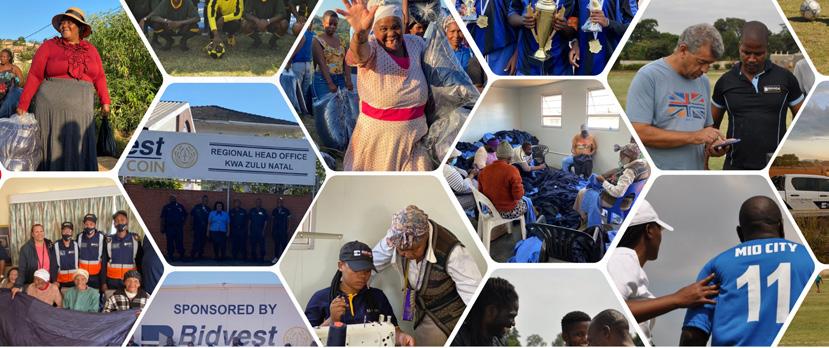
3 minute read
Ensuring sustainable supply
from ConneCT 2022
Water is a critical resource, but also one that is at significant risk across South Africa. Few people will forget the challenges and fears associated with Cape Town’s severe water shortage in 2017, when the prospect of Day Zero had citizens across the metro fearing that water resources could literally dry up at any moment. Given the essential nature of this resource, the City prioritises fair access to it, along with its careful use and effective protection and preservation. To this end, the City’s Water Strategy sets out a comprehensive and highly proactive strategic approach to meeting Cape Town’s immediate and long-term water needs.
Cape Town’s water sources
Advertisement
Cape Town gets the majority of its water –for domestic, business and agricultural use –from the Western Cape Water Supply System (WCWSS). In a ‘normal’ year, the people and businesses of Cape Town use about 60% of the available water, and agriculture uses approximately 30%. The WCWSS is managed by the national Department of Water and Sanitation (DWS) in partnership with the City.
The DWS is responsible for water resources regulation (making allocations and monitoring abstraction) as well as for water resources planning. Surface water sources make up the bulk of Cape Town’s water supply. The City’s surface water system comprises six large dams (three owned by the City) and a number of smaller ones. Total storage of the six large dams is approximately 900 million kilolitres. These dams rely on winter rains, which are increasingly variable and cannot be predicted from one year to the next.
Strategic vision
The overarching vision that informs the City’s Water Strategy is that, by 2040, Cape Town will be a watersensitive city that optimises and integrates the management of water resources to improve resilience, competitiveness and liveability for the prosperity of its people.
To achieve this vision, the City’s Water Strategy encompasses the following five key water commitments:
• safe access to water and sanitation for all
• wise use of water resources
• ensuring sufficient, reliable water from diverse sources
• shared benefits from regional water resources
• a water-sensitive city.
Ultimately, the achievement of the City’s water vision requires Cape Town to transition from being a city that is mainly focused on water supply, to one that is truly watersensitive. Water-sensitive urban design includes all the components of urban water cycle management, including supply, sewerage and stormwater management. It requires a significant shift in the way in which urban planning and design consider water and water infrastructure.
The Cape Town Water Strategy is a key component of the City’s commitment to ensuring greater resilience, and sets out a refocused and integrated urban water management approach for at least the next 10 years.
It aims to secure Cape Town’s water future by increasing the available water supply by more than 300 million litres per day over the following decade, at an approximate cost of R5.7 billion. The intention is to reduce the likelihood of severe water restrictions in the future by increasing the reliability of supply from 98% to 99.5%. To achieve this, the strategy explores investment in alternative water sources, including groundwater, wastewater reuse and desalination, to supplement water supply. It also addresses the effectiveness of network management, expanding and managing bulk water and wastewater infrastructure, and reducing the risk associated with having to share regional resources.

Sustainable energy
It’s no secret that chaos has descended upon South Africa’s electricity generation capabilities. Due to myriad factors that include inadequate investment, corruption and incompetence, the nation’s electrical utility, Eskom, has repeatedly stumbled in providing a secure supply of electricity. Beyond this, coal-fired generation is being increasingly frowned upon, and justifiably so. The fast-changing energy and urban landscape, characterised by disruptions in the electricity sector and the need to respond to climate change, has required the City to reconsider its position in terms of natural resources and environmental sustainability. At the heart of this is striking a balance between catering to growing energy consumption needs and ensuring harm to the environment is minimised as far as possible.
The City remains committed to rapidly expanding its sustainable energy programmes and ramping up its climate action ambitions towards achieving carbon neutrality by 2050. In support of this, the City of Cape Town has developed a number of programmes and projects that aim to provide adequate supply:

• an electricity-savings campaign for commercial and residential sectors
• enabling small-scale embedded generation
• energy-efficiency improvements and the introduction of renewables in municipal operations
• exploring the purchase of renewable energy directly from independent power producers
• assessing the opportunities to develop City-owned small-scale renewable-energy plants
• facilitating third-party access to the municipal grid
• investigating new, enabling technologies and fuel options for the future, including utility-scale storage and electric vehicles
• a programme to achieve net-zero carbon buildings and energy performance certification
• a strong focus on public transport, TOD, non-motorised transport and transport demand management
• landfill gas-to-energy and beneficiation processes, as well as waste minimisation initiatives
• producing the Cape Town State of Energy report series every five years to profile the City’s energy system in detail, and directly support the goal of a data-driven and evidenceled administration
• climate change response planning, such as through the City’s Climate Change Strategy and Climate Change Action Plan.



Cape Town’s is the only city government in South Africa both genuinely committed and practically able to deliver the conditions necessary for economic growth and human flourishing. For anyone wanting to conduct business or invest in South Africa, Cape Town is not only the safest but the most exciting choice. We hope you will join us in building a prosperous future in our city.”

















